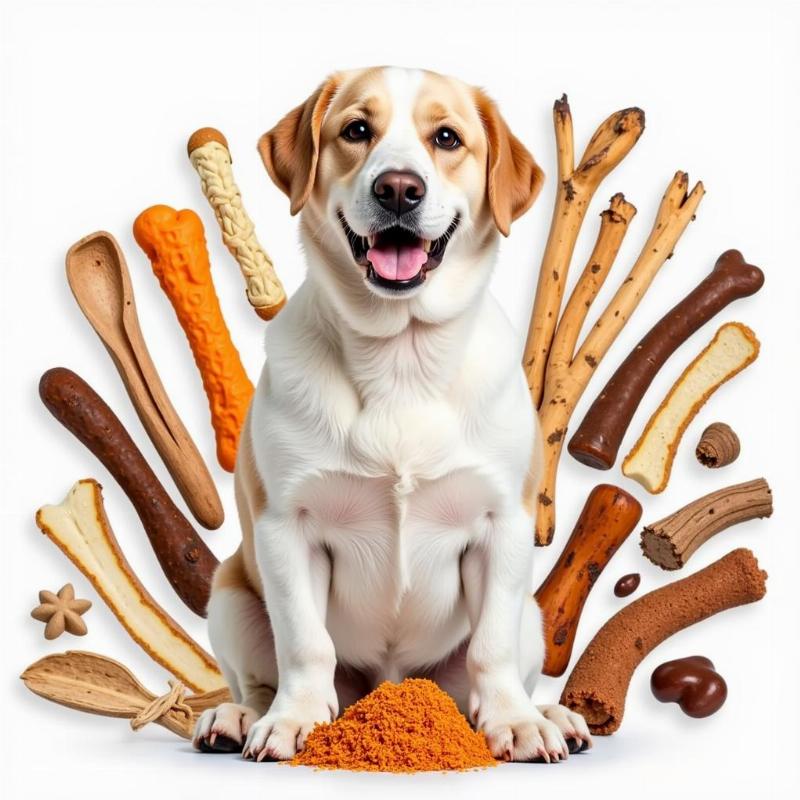Bad teeth in dogs can lead to a variety of health problems, impacting their comfort and overall well-being. Choosing the best food for dogs with bad teeth is crucial for managing their dental health and preventing further complications. This article explores the key factors to consider when selecting appropriate food, highlighting the benefits of different types and offering practical advice for maintaining your dog’s oral hygiene.
Understanding Dental Issues in Dogs
Just like humans, dogs are susceptible to plaque and tartar buildup, which can lead to gingivitis, periodontal disease, and even tooth loss. Recognizing the signs of dental problems early is crucial. These signs can include bad breath, difficulty chewing, excessive drooling, and swollen gums. Ignoring these signs can lead to more serious health issues.
Choosing the Best Food for Dogs with Bad Teeth
Several factors contribute to choosing the right food for a dog struggling with dental issues. Size, shape, and texture play a significant role in promoting mechanical cleaning action as your dog chews.
Kibble Size and Shape for Dental Health
Larger kibble encourages chewing, which helps scrape away plaque and tartar. Look for kibble specifically designed for dental care, often featuring a unique texture and shape to maximize cleaning.
Dental Chews and Treats
Dental chews and treats can be a valuable addition to your dog’s dental care routine. These are designed to promote chewing and often contain ingredients that help freshen breath. Remember to choose treats specifically designed for dental health and offer them in moderation.
 Dental Chews and Treats for Dogs
Dental Chews and Treats for Dogs
Wet Food Options for Dental Care
While dry kibble is often recommended for dental health, wet food can also be a suitable option, especially for senior dogs or those with difficulty chewing. Look for wet food formulated with dental health in mind, potentially containing ingredients that help break down plaque and tartar.
Ingredients to Look For
Certain ingredients can contribute to improved dental health in dogs. Look for foods containing enzymes that help break down plaque and tartar. Antioxidants can also help support gum health.
Avoiding Harmful Ingredients
Just as important as choosing beneficial ingredients is avoiding harmful ones. Sugary treats and foods can exacerbate dental problems. Artificial colors and flavors offer no nutritional benefit and may contribute to plaque buildup.
Home Dental Care Practices
Feeding your dog the right food is just one aspect of maintaining good oral hygiene. Regular brushing is essential for removing plaque and preventing tartar buildup. Providing chew toys can also help promote mechanical cleaning.
Professional Dental Cleanings
While home care is important, professional dental cleanings are crucial for maintaining optimal oral health. Your veterinarian can perform a thorough cleaning under anesthesia, removing built-up plaque and tartar that can’t be addressed at home.
Conclusion
Choosing the best food for dogs with bad teeth is an important step in maintaining their overall health and well-being. By considering factors such as kibble size and shape, ingredients, and incorporating regular home and professional dental care, you can help your furry friend enjoy a healthy, happy smile for years to come. Remember to consult with your veterinarian for personalized advice tailored to your dog’s specific needs.
FAQ
- What are the signs of bad teeth in dogs? Bad breath, difficulty chewing, excessive drooling, red or swollen gums, and loose teeth are all potential signs of dental problems in dogs.
- Can dry food really help clean my dog’s teeth? Yes, the abrasive action of chewing dry kibble can help scrape away plaque and tartar, promoting better dental health.
- How often should I brush my dog’s teeth? Ideally, you should brush your dog’s teeth daily, just as you would your own.
- What kind of toothbrush should I use for my dog? Use a toothbrush specifically designed for dogs, which often have softer bristles and a smaller head.
- Are dental chews and treats effective? Yes, dental chews and treats can be effective in promoting chewing and freshening breath, but choose those specifically formulated for dental health.
- How often should my dog have a professional dental cleaning? Your veterinarian can recommend the appropriate frequency for professional cleanings based on your dog’s individual needs.
- What should I do if I notice my dog has dental problems? Consult with your veterinarian as soon as possible for a proper diagnosis and treatment plan.
Related Articles
- best food for senior dogs with bad teeth
- probiotics for dogs bad breath
- food for old dogs with bad teeth
- can dogs have mozzarella string cheese
- fresh breath spray for dogs
Beautdogs.us is your premier online destination for comprehensive dog care information, breed-specific guidance, and carefully curated product recommendations. Whether you’re a new dog owner or a seasoned enthusiast, Beautdogs.us offers expert advice on everything from nutrition and grooming to training and health. Discover a wealth of resources to enhance your canine companion’s well-being and deepen your bond. Contact us at [email protected] or +1 501-555-7529.